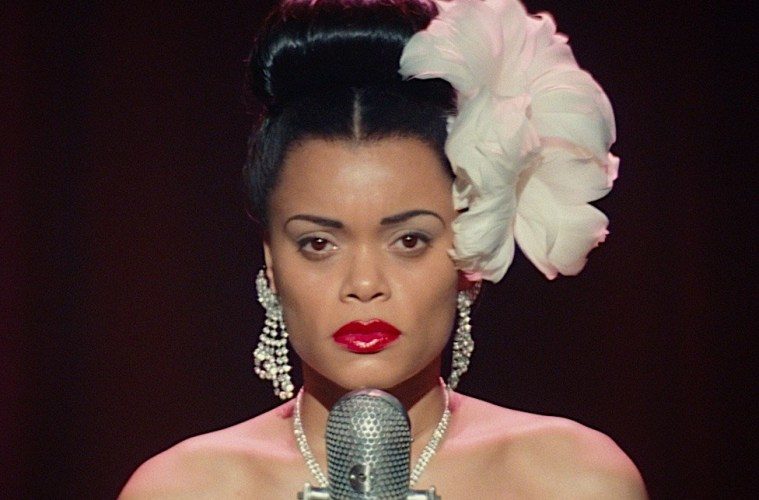The United States vs. Billie Holiday opens as gossip columnist, Reginald Lord Devine (Leslie Jordan) interviews jazz legend Billie Holiday (Andra Day) asking her insipid questions like, “What’s it like to be a colored woman?” and “Why do you keep singing that song?” Exasperated, Billie sighs smoky-voiced, “Ever seen a lynching?”
The song in question is “Strange Fruit,” a haunting ballad that details racial violence in the South. By the end of Lee Daniels’ new biopic, we realize that the classic track was both Billie Holiday’s greatest triumph and most tragic work. When the United States government publicly denounced the song, claiming it would elicit racial unrest, Holiday refused to stop singing it, defying their threats, and in doing so helping to lay the groundwork for the Civil Rights Movement.
The FBI’s relentless crusade against Holiday lasted two decades and was one of the contributing factors to her early death at 44. Like recent releases such as Judas and the Black Messiah and MLK/FBI, this film reveals another sad chapter in our country’s history when the government attempted to silence Black voices.
Unlike 1973’s Lady Sings the Blues, which gave us the broad strokes of Billie Holiday’s career, director Lee Daniels and screenwriter Suzan-Lori Parks concentrate on the latter half of the singer’s turbulent life, specifically her harassment by the Federal Bureau of Narcotics. Led by an obsessive Harry Anslinger (Garrett Hedlund), the FBN targeted Holiday for drug use, which was merely a smokescreen to stop her from singing “Strange Fruit.”
After the loose frame of Devine’s 1957 interview, Lee wastes no time in immersing us in Holiday’s early life and struggles within 1940’s and 50’s America, intercutting between her battle with drugs, chaotic love life and Anslinger’s fanatical campaign against her. Obsessive in his hatred for the singer, Anslinger hires Black FBI agent Jimmy Fletcher (Moonlight’s Trevante Rhodes) to infiltrate Holiday’s entourage of friends and musicians. The idealistic Fletcher initially believes in the government’s anti-drug fight and even orchestrates Holiday’s arrest on drug possession. A year later however, after Holiday is released from prison, Fletcher has a change of heart, and still working undercover (at least to Anslinger), he ingratiates himself with Holiday’s crew. Like a lot of elements in the film, their relationship is a bit spotty and unconvincing, but at least it’s not boring.
If you’re at all familiar with Daniels’ resume (Precious, The Butler, the TV series Empire), you know that subtlety is not his strong suit. The Academy-Award nominated filmmaker might utilize character-driven stories as a canvas, but he paints with thick layers of melodrama, which tends to blot out structure or anything resembling reality. However, his knack for Shakespearean tragedy and his instinctual ability to extract powerful performances creates an air of gloom and unpredictability, which works for the story, occasionally.
The problem with the film lies in playwright Parks’ script, which is prolific, but careens in too many directions. At times, the narrative struggles under the duress of awkward transitions and extraneous information about the singer’s persecution. The film simply works best when we bear witness to Holiday’s interaction with her friends and the men in her life. Particularly, there’s a wonderful authenticity in the scenes when she’s simply hanging backstage. Actually, there are a lot of great supporting roles here. Hedlund manages to pump some blood into Anslinger’s two-dimensional agent; Natasha Lyonne exudes a subtle and endearing protectiveness as Billie’s occasional lover, Tallulah Bankhead; Tone Bell gives a powerful turn as a sinister nightclub owner; and Rob Morgan is equally effective as Holiday’s abusive husband, Louis McKay.
This movie hauls a lot of material, which recurrently weighs down the story, but it has a big heart thumping underneath its surface. Daniels depicts Holiday’s addiction with such depth and understanding, we can’t help but empathize with her struggle. This is especially apparent in a surrealist, drug-hazed sequence where a young Billie takes us by the hand and leads us through her life, from her childhood in a brothel to a harrowing encounter during the aftermath of a lynching, which leads to an inspired rendition of “Strange Fruit.” It’s a great cinematic moment. Without preaching, Daniels and Parks peel back the inherent hypocrisy and bigotry in the so-called “war on drugs,” even from its conception, making for a potent message.
But the main reason to see United States is for Day, who inhabits the soul and physique of Holiday with an effortless grace. There’s not a moment when the Grammy-nominated singer is onscreen that you’re not mesmerized and it’s extremely hard to believe this is her first acting role. Of course, she can sing like the legend by adjusting her rich, sultry vocals, but she also personalizes her take with a naturalness that shatters any preconceptions that might feel like basic mimicry. With her bruised stare, fierce humor, impulsive fits of anger and gravelly voiced passion, Day taps into Holiday’s complexities while simultaneously revealing her humanity. It’s an extraordinary performance, and deserving of last night’s Golden Globe win (which was historic itself; she’s only the second Black woman in history to win Best Actress for a drama).
Overall, The United States vs. Billie Holiday is a bit messy and uneven, but worth the time. It’s a fascinating piece of history and a poignant journey into a great artist’s intricate life. Even as “Strange Fruit” planted the seeds of Holiday’s destruction, it also cemented her legacy as a freedom fighter. Daniels is basically asking if it was worth it. By the end of the film, it’s apparent that it was.
Advertising disclosure: We may receive compensation for some of the links in our stories. Thank you for supporting Irvine Weekly and our advertisers.

